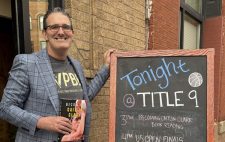Dallas sucks. But their food doesn’t.
At least, that’s the thought that sparked a whole new career trajectory for former Eagles chef Tim Lopez.
For Lopez, cooking has always been a kind of magic. He still remembers being 11 years old, standing in the kitchen with his grandmother and aunts, learning how to read a recipe and turn a handful of ingredients into something that could nourish, comfort and bring people together.
“I just loved the process – reading a recipe, understanding the techniques, putting ingredients together like a puzzle,” he says. “It felt like magic. You combined certain things in a certain way and out came something delicious.”
That sense of cooking as connection has carried him through a career that has stretched from restaurants and country clubs to one of the most high-profile kitchens in American sports: the training facility of the Philadelphia Eagles.
Lopez was working for Flick Hospitality, a corporate dining company, when he heard about an opening with the Eagles. Flick had a sub-division, Flick Athletics, which serviced national sports accounts. The Eagles were their very first.
It was, he admits, a definite step up in excitement.
“I saw it as a more glamorous opportunity and a chance to cook a different style of cuisine,” says Lopez. “This wasn’t your typical corporate dining gig – it was all about fueling athletes. That meant a stronger focus on nutrition, different types of menus and a completely different mindset.”
He wound up staying for 14 years, from 2006 until just before Covid hit in 2020.
Lopez, who has lived in South Jersey for more than 20 years, was already an Eagles fan, but working for the team was something else entirely.
“When I first got there, Donovan McNabb was quarterback, Andy Reid was coach, Terrell Owens was there,” he says. “It was surreal meeting these people who were huge celebrities.”
The star-struck feeling faded quickly.
“I realized I needed to focus on the cooking itself and the people I was cooking for,” says Lopez. “They might be star quarterbacks and football legends, but they still had nutritional needs. They needed meals on time so they could get to practice. That became my focus – helping them get what they needed to be ready for Sunday games.”
Cooking for athletes also meant adjusting to volume and nutrition.
“In restaurants, you’re making a plate at a time, or maybe catering for 50 or 500 people,” he says. “But athletes eat so much more. They’re burning it all off on the field. We always had to prepare more protein, more carbs, more of everything, and make sure nothing ran out.”
Over time, the Eagles’ nutrition staff worked closely with Lopez and his team to build menus around performance.
“The idea was simple: Put the best possible fuel into them, and you’d get the best result on the field,” he says. “I learned so much about nutrition, and it made me a better chef. It wasn’t just wings and pizza. It was about building meals that kept their diets fresh, balanced and sound enough to shorten recovery and build stronger athletes.”
Lopez also built trust through something much simpler – remembering what players liked to eat.
“One story that stands out is with Brandon Graham,” says Lopez. “He’s such an outgoing guy, and I got to know his preferences really well. He loved steak – so much that he could eat it for breakfast and often did. He’d walk into the cafeteria, see me at the open kitchen and yell, ‘Make my usual!’”
That sparked an idea.
“What if I could figure out every player’s usual? I don’t have the best memory, so I started writing everything down – how they liked things cooked, whether they were creatures of habit or switched it up,” he says. “I hung a notebook by my station and filled it with their orders.”
It worked. Soon players like Lane Johnson, Jason Kelce and Brent Celek were texting Lopez on their way to the facility, asking him to have their breakfasts waiting.
“It made everything smoother,” he says. “Their days were so structured, and being able to grab the exact meal they wanted quickly made a difference.”
Around 2014 or 2015, Lopez and fellow chef Gabriel Nesmith began experimenting with a new idea. They called it Devour the Competition.
“The concept was simple: if food is part of who we are, then cooking the food of our opponents was a way to ‘eat our rivals.’ If it was the Saints, we’d make gumbo or po’ boys,” says Lopez. “Once a week, the team let us run with it in the cafe.”
Some worried it was bad luck.
“People said, why make Dallas food when you’re playing the Cowboys? Just stick to Philly food,” he says. “But to us, it wasn’t about honoring the team – it was about celebrating regional cuisine. I’d tell the players, ‘You can say Dallas sucks, but their food doesn’t. Every city has its culinary history, and that’s worth lifting up.’”
The program connected culture, performance and fun – and it planted a seed in Lopez’s mind. He started keeping notes, saving recipes, jotting down stories. Over time, he realized he was building a cookbook in his head.
About a year and a half ago, a publisher reached out. They’d seen his Instagram posts about Devour the Competition and asked if he’d ever considered turning it into a cookbook. The result is “Kickoff Kitchen,” a collection of recipes inspired by NFL cities, paired with the history and culture that made them.
“Even if you hate a rival team, their food and the culture behind it still have value,” Lopez says. “These dishes carry working-class histories and traditions that reflect the fan bases. Pulling that together – the recipes, the histories, the connections – finally coalesced into the cookbook.”
More than anything, Lopez hopes the book inspires people to try foods they might otherwise pass over.
“It’s easy to look at a recipe and think, ‘I don’t like Mexican food, so I’ll skip green chili queso.’ But I don’t want people to skip it,” he says. “The point is to use football as an excuse to explore cuisines across the country. You might discover something you really love.”
For Lopez, football and food share the same cultural DNA.
“Sports are tied into working-class culture, family culture – things passed down generation to generation,” he says. “The same is true of food. Regional cuisines, game-day recipes, family traditions – they all carry history forward.”
That’s what “Kickoff Kitchen” is about: stories, histories, flavors and connections. And Lopez hopes people argue about it.
“When the ‘Pittsburgh Post-Gazette’ criticized me for putting mushroom sauce on pierogies, I thought – good,” he says. “That means people care about their food culture. Debate leads to stories, and stories lead to connection.”
After 14 years of feeding Eagles legends, Lopez is now feeding fans across the country, through recipes that tell the story of who we are, where we come from and what we eat on game day.
“I just hope people cook these recipes, taste outside their comfort zone,” he says, “and discover the culture behind the food.”
Click to see Tim’s recipe for his Italian Roast Pork sandwich.
















